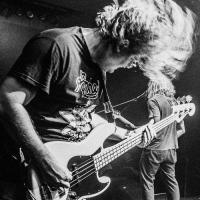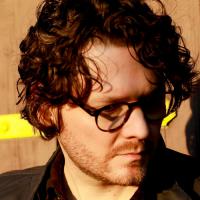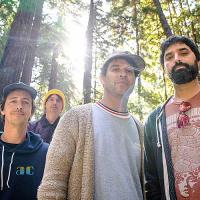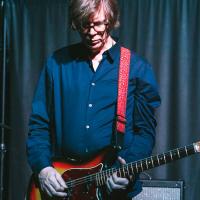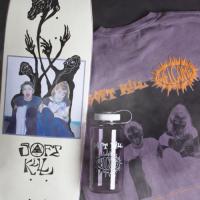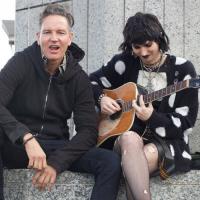Beirut Interview
6/05/2022
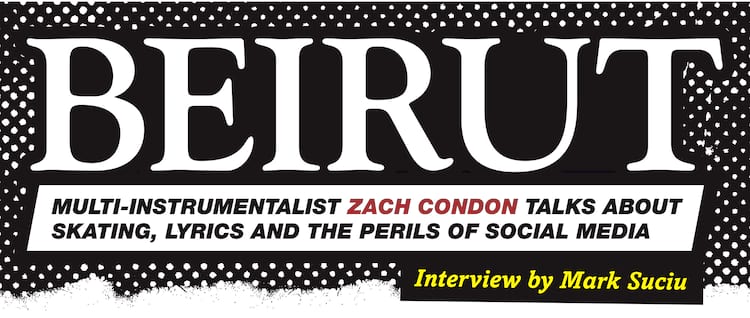
I SPOKE with Zach Condon—lead singer, writer and face of the band Beirut—on the day Russia invaded Ukraine. He was troubled by the news, as well as concerned for its effect on his hometown of Berlin. A skater kid who grew up in New Mexico, Condon’s interests have always led him abroad. In his new retrospective album Artifacts, we glimpse the artist exploring his talents and engaging with influences from around the world. I was interested by the self-reflective, curatorial work of the album. As I talked to Condon, he illuminated something I know well as a skater—building a career based on your passion is often conflicting, but a lifelong interest can withstand the resulting stress. That interest is an ever-present resource, an undercurrent that can always be used to refresh and renew your work. —Mark Suciu
Thank you for the years of inspiration through your music, and thank you for the rights to those songs I skated to. Were you part of that decision?
I have a rule with my manager that any skate-related questions go directly to me. But I don’t remember. All I know is that when I saw the video, it was a surprise again, which is nice.
I have a rule with my manager that any skate-related questions go directly to me. But I don’t remember. All I know is that when I saw the video, it was a surprise again, which is nice.
So are you a skate nerd?
Yeah, I’m a huge skate nerd. The last time I was on a skateboard, I broke my wrist at Cooper Park in Brooklyn, where I’ve seen you skate on your Instagram. As a kid, skating was plan A. I didn’t have anything else. It was everything in the world to me. From the age of nine years old until I was 16 I was skating every day. I would go to California once a year and I would skate in San Diego. I even got as far as getting sponsored by the local skateshop in Santa Fe, which is not big news. They filmed me for a video and then the guy that owned the shop was like, “I want you on the team.” And I was like, “That’s great. I’m in.” And then he said, “You’ve got to do contests.” And I was like, “I can’t do contests.” And then he was like, “Well, maybe not then.” And then on top of that, some other kid from the park came in and was like, “Oh, Zach doesn’t have a good bag of tricks.” I was like, What? “He doesn’t have a lot of variation. He’s only impressive doing this handful of tricks.”
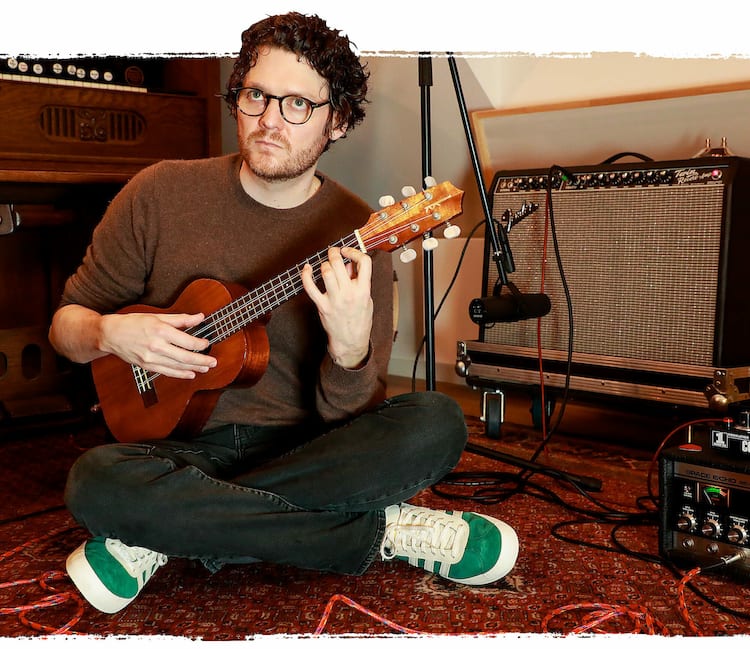 Photo: Gaisser
Photo: GaisserSabotage!
Total sabotage. So growing up, skateboarding was everything to me. I was the type of kid that would go downtown every day, nine o’clock in the morning 'til nine o’clock at night, skating. I lived at the skateshop. Every video that came out in those years, me and my friends would line up at the door waiting to watch them. From Menikmati to Extremely Sorry, that whole era was when I was still skating. So I know all these pros; I know all the stuff; I still watch stuff obsessively. Late at night, I put on skate videos and some music.
So you don’t listen to the songs in the skate videos?
Not always, but sometimes. That’s the funny thing, right? Watching skating without the sound of skating sucks. It takes a lot out of it. There’s something about hearing the grind, hearing the concrete that really brings out the experience. But sometimes I’m like, I can’t. Sorry, I’m not in the mood for some thrash punk right now. I’m trying to relax and chill, so I’ll put on some headphones and watch the video, which I feel a little bad about. It’s their artistic choice, so I try not to do that. But it happens. In the last five years or so, it’s gotten hard to keep up with skateboarding. At this point, it’s moving so fast. When I was skating, I would see the pros do stuff that I could picture doing. I’m not telling you I could do anything that I saw on Menikmati and shit like that, but the lines in between, I could picture myself doing those tricks. But then around 2003 or 2004, I noticed that it started to escalate to a degree that I’m like, There’s no way I could have competed in that field, at all.
I feel like people started realizing that they were putting a lot of filler into video parts, and that every clip could be hard-hitting if they put in enough time.
Absolutely. I would have been a Baker fan around that time, because I like seeing Ali Boulala drop off big shit. Because that was something I could still relate to. I was an idiot when it came to throwing myself off of big things. I wasn’t very technical. Anyway, around that era I started to drop off. I get the feeling that my knowledge of skateboarding is very much of the generation before, to an extent.
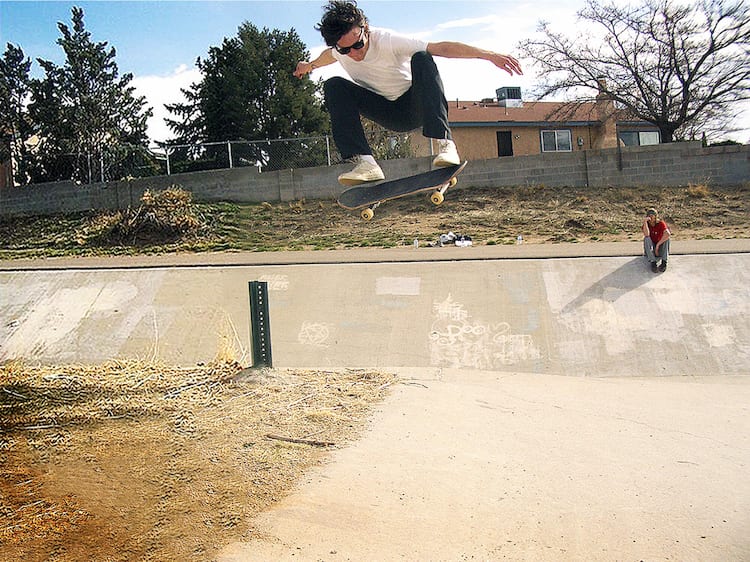
Zach sends a postcard from New Mexico. / Photo: Holmes
Let’s talk about your new album Artifacts.
It’s this tiny idea that blew apart. I took a small re-release and I made it into an anthology, deep-dive into my own musical history. The idea was to re-release the Lon Gisland EP, which was from 2006. I did it after I wrote all the Gulag Orkestar stuff when I was 19. And before I turned 20, I did the Elephant Gun EP, and that was my first EP with a band and in a professional studio. Someone recommended that to me and then I went obsessive, because I always do. When I started putting old demos on there, I thought, I’m just gonna crack this open and do it fully.
I like that you have a working relationship with your old stuff. On the song “Santa Fe,” I thought I noticed a melody from one of the songs on The Joys of Losing Weight. Is this an attempt to stay, like Joan Didion says, “on nodding terms with the people we used to be?” Or is it a deeper connection?
I was working on a new album when this idea came up. I was all about, Just keep the blinders on and keep going forward. But the thing is, I’ve always loved my old material. I just didn’t know if people would understand it. Because at the age of 15 or 16, I had this creeping feeling that I was doing something special. At the time, I thought I was a megalomaniac, like someone who is near psychopathic—grandiosity. I come from a family that is so depressive, humbled, quiet and self-isolating. For me to be proud of something I did felt like it was unhealthy. So I’ve always kept a lid on that stuff in some way. It wasn’t until the record got signed and reviews came in that I was like, I think maybe I’m doing something people like. Maybe it’s not just delusional sickness in my head. After all these years, I cracked that stuff open and was like, I’m going to put this out there and I’m going to see what people say; see if they hear what I hear. It’s interesting to see where someone came from and where they went. You mentioned The Joys of Losing Weight. That was leaked material. It ended up online. And I remember finding it and at first being like, Oh, damn. I didn’t mean for this to be out there. And then I saw the comments, then people after shows, they’re coming up to me saying, “My favorite thing is The Joys of Losing Weight.” That was a joke title I had come up with. I found it incredible that they could hear through all the accidents, through all the bad recording. I didn’t know what I was doing with the equipment back then. But through that, they were relating to it. Some of those songs don’t really even have lyrics. I hated my own thoughts so much back then that I couldn’t stand to write them down. If I wrote lyrics, if I wrote in a journal, I would look at it and I would be disgusted by it. So I would sing gibberish in order to feel out the melodies, enjoy my voice and leave it at that. I had no idea why but people really connected with it.
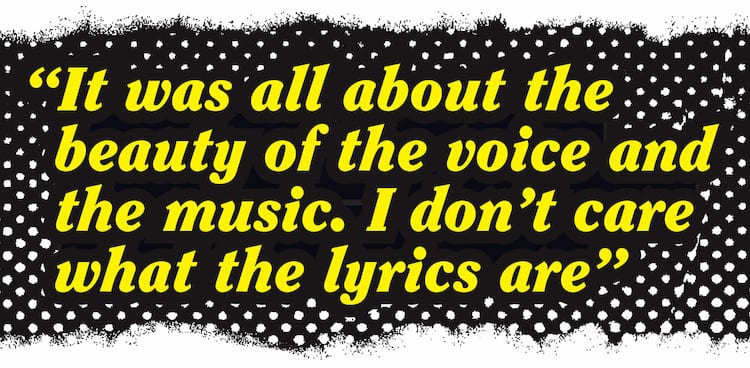
What do your lyrics mean to you now? You’ve said before that you wished music didn’t have lyrics but losing your voice is one of your biggest fears.
It’s almost like a sense of disgust of my own thoughts. When I wrote lyrics, it was such a frustration. So what happens when I write a song—I always believed that lyrics weren’t important in music. Because what I fell in love with was the harmony, the melody and the tonalities of the instruments. I really felt like people focus way too much on lyrics. In my early days, my manifesto was like, Yeah, if you want that, read a book. Music is its own unique art form. It’s mysterious, very inexplicable. It works for reasons unknown to us, but it does, and that’s what’s important. So, of course, I loved singing on songs. The voice is an instrument. When you listen to old choir music, the lyrics are so muddled and lost anyway, it’s not even important. Most of the music I was listening to when I started would have been like—I can’t understand Turkish; I don’t speak Farsi, you know? It was all about the beauty of the voice and the music. I don’t care what the lyrics are. I was 26 when I first learned the lyrics to a song I’d been listening to since I was five years old, because I put on headphones for the first time. It was the Beach Boys. It’s the one that goes, “And we’ll have fun, fun, fun now that daddy took the T-bird away.” As a kid I used to think it was “til’ the daddy takes the tuber away” or something like that. I thought it was like an inner tube. But it’s always secondary to the music. In music the sound is the goal and that stuff is secondary. That being said, I think I’m a bit extreme and I think I’m a bit over the top with it. I do think a lot of it comes from a kind of self- consciousness of my own thoughts of seeing them written down, or hearing them out loud, or not knowing what makes good lyrics versus bad lyrics because it’s not my wheelhouse.
Your brother has written lyrics for you. Do you still collaborate with him?
I wish, because I love what he did back then. He’s studying to be a lawyer now; he has a brand new child, so it’s not really in the cards. The truth is that we haven’t really been working together on lyrics since we were younger. The last one he wrote lyrics for was The Flying Club Cup—a couple of songs on that. And after that, with writing, he hasn’t been doing it as much. He doesn’t feel quite up to his own standards. He has a lot of self-consciousness and self-doubt about his own abilities. And that hit him pretty hard around 24 or 25. We all got hit the worst at that time. It’s funny, I’m the middle child of three brothers. We all hit the same issues at the same time, in a row.
I love the Spotify playlists you’ve been making. Listening to music seems to be a very active means of inspiration for you.
I approach music probably like an addict approaches their addiction, in some ways. If I had it my way there’d be a record on in the background pretty much all day. I have a more active listening period at night. I’m a night owl. I’m usually up ’til six in the morning and get up in the afternoon. I like the nighttime; I like the city and the world being turned off. Usually late at night, I have this hour of research or enjoying what I’ve discovered. And that’s what those playlists are supposed to represent—these nightly excursions.
I wanted to draw some parallels to skating and the anxiety of having a career and trying to organize it. You said you were having a terrible year in 2019 and then this purity of interest presented itself. Because you love what you do, it always surrounds you and inroads you back into an authentic experience.
I’ve only had a few times where I tried to get out, so to speak. But that was purely symbolic. That’s the thing I love about skateboarding—growing up, my dad was trying to get me into team sports. He was a real stern, critical, cynical guy. And he’s like, You need some discipline in your life. He’s signing me up for things like baseball, soccer, football and I’m miserable. Any time things got competitive, I got really turned off. Then my brother brought home a skateboard and I went to the skatepark. It’s very democratic, very open-minded, everyone is on their own level. This guy over there is learning hardflips, I’m over here learning how to ollie. But he’s looking at me saying, “Keep going, kid. That’s great.” And I love that so much, just the fact that you’re beating yourself against concrete day in and day out for this passion of that one moment, that one trick. That’s so similar to music—knocking your head against the wall until you get the song right. Releasing video parts is like releasing an album. As a kid waiting for these videos to drop was like waiting for your favorite artist’s album to drop. But it is interesting that music keeps calling me back. My partner was mad at me because we were supposed to go to Norway to relax, and I brought a bunch of equipment with me to record and I spent most of my time in this church on this little island in Norway just fucking mad scientist style trying to get into it.
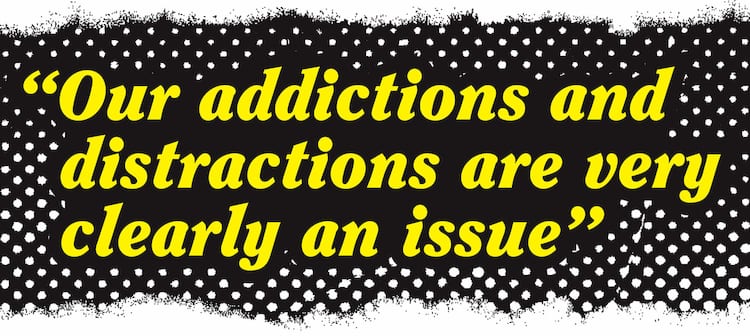
Can you record at your house?
Yeah, I have a studio in my apartment. I’ve always written in my own home space. I started that way when I was a kid and someone gave me a computer. Well, first on four tracks, analog tape, but it was just my bedroom. My bedroom got so filled up with instruments that by the time I had dropped out of high school and left home, I didn’t have room for my bed. I would put the mattress against the wall, and then record all night. And then day would come and I would drop the mattress down, pass out for a few hours and then pretend to go to school. So for me, the studio is not a writing place. That makes no sense to me. The other thing is, since I’m a one-man band in a lot of ways, I don’t write with others. With the drum parts and bass lines, nine times out of 10 I write those as well. And I’m like, Can you do that? But for me, building a song wasn’t me sitting with a guitar and being like, Oh, wait ’til the band hears this. It’s always been that I start stacking things to see what sounds good together. That’s also the reason a lot of my songs are very repetitive, because it’s not like I have a band to suddenly just change direction. So if you listen to my songs, you might start to notice that it’s very much like the same chord progression and me changing the ideas and dynamics over it.
Did you unknob Hubba Hideout?
No. I have a picture of me ollieing it, though. That was all I could do at the time. I might have landed a backside 180. I must have been 13 or 14. I couldn’t get up that high. I had good pop, but I couldn’t get up to the ledge. I couldn’t fucking believe it when I saw it. I was thinking of Brian Anderson frontside bluntsliding that shit. Like, You’ve got to be fucking kidding me. How does anyone even do this? Also, another thing you should understand, the level of skating in Santa Fe versus California—we had a guy who hit a four-stair handrail and all of us were like, He’s probably the first dude in Santa Fe to hit a rail. I always wanted to skate Pier 7. We couldn’t put our boards down without people shooing us away. We went to Embarcadero and everything. The Gonz gap wasn’t there, but that’s what I wanted to do. That was my jam.
You were hucking. Skating is about traveling. Is music about that, too?
Not for everyone. I don’t know where the hell that element snuck so deeply into my music. I almost got mad at it because I didn’t want to get pigeonholed as this wide-eyed indie dude just wandering around like, Look how precious the world is. I hated that imagery. My own band mates pointed it out once when I had bad writer’s block. They were like, Maybe you need to go on a trip? It’s like, Aw, fuck you. But it’s true. It represented something bigger when I was a kid and I felt trapped. I had this form of escapism that manifested itself in music, movies and daydreaming about traveling—what the world was like outside of such an isolated place like Santa Fe. It took on such big proportions that it kind of stuck. It came out in the music whether I liked it or not. But I do feel kind of silly sometimes, like I’m overdoing it. But whatever. Yeah, it’s there.
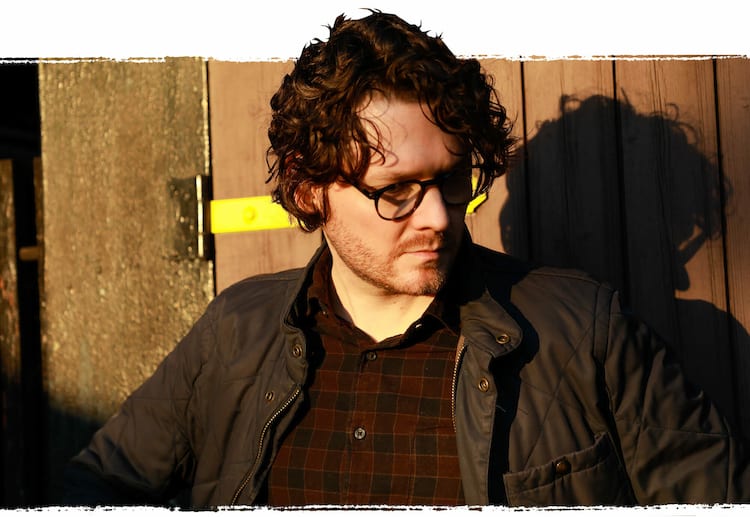
Photo: 4AD
How do you feel about Instagram?
I wanted to avoid all social media from the beginning of my career. There’s something off about it. I was wary of the advertising element of it. I was wary of the influencer movement coming about. I found that to be creepy and unnerving. I know that travel influencers are really big. I know the realities of travel are so unromantic compared to this bullshit they’re posting, so it made me feel off. Joining social media wasn’t my idea. What happened was, when I tried to disappear off the face of the planet, my girlfriend was like, If you’re not going to play shows, why don’t you try to connect with the fans anyway? Because they would probably appreciate it. They would probably like to know a little bit about you. It seems weird that you just disappeared. I thought that she had a good point, and all of a sudden I saw this innocent side of social media—this idea that it’s just to connect. And that’s been the real joy of experiencing the naive, fun side of it, instead of all this creepy advertisement stuff. I put up an ad that the new album’s out; we bought an ad. Then immediately we were like, This feels fucked up. I don’t like this. And we took it down because we were like, That’s not what this is for. This is a way for me to stay somewhat relevant in people’s minds. But also, I actually legit enjoy when I put those playlists up and a small amount of people love them. They’re not my most popular thing. They don’t get as much attention, but the people that do like them are like, Please don’t stop doing this. This is really fun. And I’m like, Great, because it’s so much fun for me. So I’m trying to stay in this place where it’s genuine and meaningful and I’m not bombarding people with my life and with advertisements and shit like that. It’s not something I ever thought I would do, so that was a huge surprise.
I’m a big fan of it. So you had to cancel a lot of shows in 2019 and you tried to disappear off the face of the world. And you’ve been through some low moments touring before. Now, on Instagram, you’ve been more vocal about promoting mental health and wellness, and just trying to do things in a transparent way to make things easier for you, but also engage with your fans. What’s been helping you through mental-health battles lately?
Oh, man, to be super blunt, I was a heavy, heavy drinker. The best way to deal with the world for me, since I was about 15 years old, was to just drink it away in a haze, pretty much. When you come from that mentality—I mean, just look at how obsessively I approach music research and instrumentation. You can see that I have this very obsessive mind. But ways I’m actually dealing with it? Honestly, it’s a combination of meditation and some assisted-therapeutic-type of stuff. I think that’s actually important. And a lot of fucking research, because the self-help world is so full of snake-oil salesmen and magical thinking—people who think they’ve solved everything when, in fact, they’ve just hit another roadblock and they don’t realize it. Which I find really unfortunate. So it’s been this three-year trip of just taking the things that work from many different sources and leaving a lot of the fucking bullshit aside. I think the world is starting to wake up in Western society about the fact that we weren’t built for this. Just biologically speaking, we weren’t built for the world we live in, you know? We’re all anxious and messed up. I think to an extent, we are all kind of culturally a bit damaged in certain ways. All this discussion about introvert versus extrovert, it’s circling around the issue that I think in our society we’re raised fucked up. They’ve done the research with hunter-gatherer tribes, just to kind of get an idea of what human life is supposed to look like. Our neuroses as a culture is not healthy. Our addictions and distractions are very clearly an issue.
What do you get from the research? How does it help you?
What is important is recognizing your own patterns. It’s really an attempt at a reality acceptance type of thing. To say, “This is my issue, this is my pattern, and I’m responsible for changing it.” That’s the simplest way I can think about it. In a roundabout way, skateboarding kind of pushed me in the direction of looking for help, trying to deal with issues. I remember watching Ali Boulala open up about addiction and that was literally the moment I finally saw clearly my own issues and responsibilities in regards to drinking. It was hearing him talk about something so candidly and honestly that it got me to open up to it myself. I know about the Ben Raemer’s Foundation and that there’s some movement in the skateboarding world about mental health right now, so I thought it would be nice to point out how much these things are actually helping and having an effect, just getting people to talk about it.
-
4/18/2024
Skegss Interview
Australia's Skegss are the reverb drenched summer soundtrack you need. Read the exclusive Thrasher interview. -
4/18/2024
Beirut Interview
The music of Beirut has been featured in many skate vids over the years, most notably in Mark Suciu’s “Verso” masterpiece. Mark caught up with Zach Condon, the man behind the band, in this exclusive interview. -
4/18/2024
Tom DeLonge Interview
Angels & Airwaves was born out of Tom DeLonge leaving Blink-182. Here he talks about charting that band’s own path along with his thoughts on skating and UFOs. -
4/18/2024
Greta Van Fleet Interview
Using musical chemistry, the band members of Greta Van Fleet extract the essence of various classic rock anthems. They combine the parts they like and create a sound all their own. These guys truly rock and roll. -
4/18/2024
Mononeon Interview
The term "musical prodigy" doesn't quite capture the bass-playing abilities of Mononeon. It's more accurate to say he's one of the best to ever pick up the instrument. See for yourself. -
4/18/2024
Animal Collective Interview
Animal Collective blew up in the skate world when their song was used in Jake Johnson's Mind Field part—which is regarded as a masterpiece of skating/editing/music. The band's unique legacy and sound has only gotten stronger in the following years. -
4/18/2024
Thurston Moore's Interview
Thurston is a founding member of Sonic Youth and a guitar virtuoso. His various projects have created a rich musical legacy. He also has deep roots with skating and video-making. Here he describes the mutual affection between skating and his music. -
4/18/2024
Soft Kill x Welcome Skateboards
Welcome gets the singer from Soft Kill on the line to discuss music, addiction and their recent collaboration. -
4/18/2024
R.A. the Rugged Man Interview
During his 30-year career, R.A. has occupied both the spotlight and the status of an underground hip-hop legend. His song "Uncommon Valor" is regarded as a lyrcial masterpiece and he shows no signs of stopping. -
4/18/2024
Third Eye Blind Interview
After millions of album sales since the mid-90s, Third Eye Blind frontman Stephan Jenkins continues to make music without compromise or concern about radio hits and pop charts. He features Cher Strauberry in his newest video and she sat with him for an interview.
